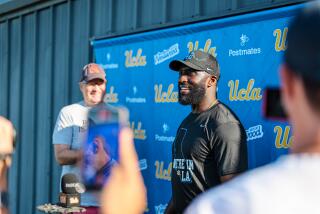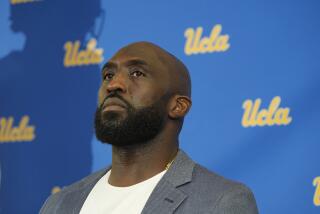Putting a Coach in Your Corner
- Share via
Mike Calamusa is trying to get a better grip on things as he juggles family responsibilities with the demands of running his small publishing house.
Now he has a “personal coach” in his corner who’s helping him keep all the balls in the air.
Calamusa, 38, is one of a growing number of baby boomers who are turning to coaches for their personal and business growth.
What having a personal trainer is to your body, having a personal coach can be to your mind, said Thomas Leonard, founder of Coach University, a Florida-based electronic training program for people who want to become personal coaches.
Coaches are not quite mentors (because they get paid), not quite consultants (because they stick with you after making recommendations) and not quite counselors (they’re trained to refer you if what you really need is therapy).
“My job is to support my clients in whatever they want to do, help them to clarify and reach their goals,” said Steve Shull, a former linebacker for the Miami Dolphins whose Brentwood practice, Performance Coaching, specializes in coaching real estate professionals.
“The people I’m working with are usually very successful but are looking to maintain their competitive edge,” Shull said, adding that most are between the ages of 30 and 45.
People at all stages of their professional development are hiring coaches, said Leonard, a former tax accountant and certified financial planner who got the idea for Coach University after realizing that an increasing number of his clients--90% of them boomers--were coming to him with questions about their lives, not just their money.
It’s not a coincidence that coaching appeals to baby boomers, he said. Older people tend to be less flexible, which makes them less coachable. And younger people tend not to recognize the value of coaching: “They think they already know everything,” Leonard said.
Most of the coaches are boomers themselves. Their average age is 46, said Leonard, who has trained more than 1,000 full-time coaches from a variety of backgrounds. About 10% are licensed therapists. The rest come from the ranks of management consultants, executives, teachers, priests, lawyers and accountants.
The reasons people use coaches are varied. Chief executives frequently look for coaches to serve as objective sounding boards, Leonard said. A university professor torn between teaching and publishing responsibilities used a coach to help her figure out how to prioritize her work life. A few companies have hired coaches to help midlevel executives smooth out relationships with employees. Many independent business owners seek out coaches to keep them on track as they build their businesses.
Linda Miller, a marriage and family therapist with a practice in Bellevue, Wash., hired a coach to help her fine-tune her business.
“I was finding even my experience with therapy did not get me unstuck in some areas of my life,” she said.
For example, Miller wanted to keep her practice at 15 hours a week but kept shutting down her client pipeline too soon for fear of overshooting her goal. As a result, she wasn’t working enough. Her coach suggested she think of working a minimum of 15 hours a week instead of a maximum. Miller was so pleased with the results that she has since become a part-time coach herself.
For Calamusa, who runs Drive Media, a Concord, Calif.-based publishing house that caters to car enthusiasts, coaching brings perspective.
“When you’re involved in a business for so long, you can’t see the forest for the trees,” he said.
He hired a coach instead of a consultant because the idea of learning how to fix problems himself was appealing. “Consultants analyze problems and tell you how to fix them,” he said. “But if somebody does the math for you, you’ll never learn.”
So how do you know whether a coach is any good? If they aren’t helping you, fire them, Leonard said. The field is quite new, but what research exists suggests that most people stick with a coach for about two years, using them about half an hour a week. Most coaches charge $100 to $200 an hour.
Although there is currently no licensing requirement for personal coaches, coaches themselves have formed a trade organization called the International Coach Federation that aims to maintain professional standards. The organization plans to offer a national certification exam starting in June. (For more information, call [800] 48-COACH.)
Leonard’s coaches undergo a two-year training program at a cost of about $2,500. The training consists of weekly discussion-style classes held through conference calls or on the Internet. Much of the training focuses on communication and goal-setting skills.
When looking for a coach, the most important factors are to “find a fit, trust your instincts, check that the coach has knowledge about your niche or industry and ask for credentials,” said Ernest Oriente, a former advertising and publishing executive who now runs a full-time coaching practice called PowerHour from his patio in Irvine. “And ask yourself what you want to get out of it.”
“The mentality of the generation before us would not have gone for this at all,” Calamusa said. The attitude then was if you put your nose to the grindstone, you could succeed at anything. “It’s a different thing for us; we don’t see the security of business anymore. Individuals have to take charge of managing their own lives and careers.”
More to Read
Inside the business of entertainment
The Wide Shot brings you news, analysis and insights on everything from streaming wars to production — and what it all means for the future.
You may occasionally receive promotional content from the Los Angeles Times.










